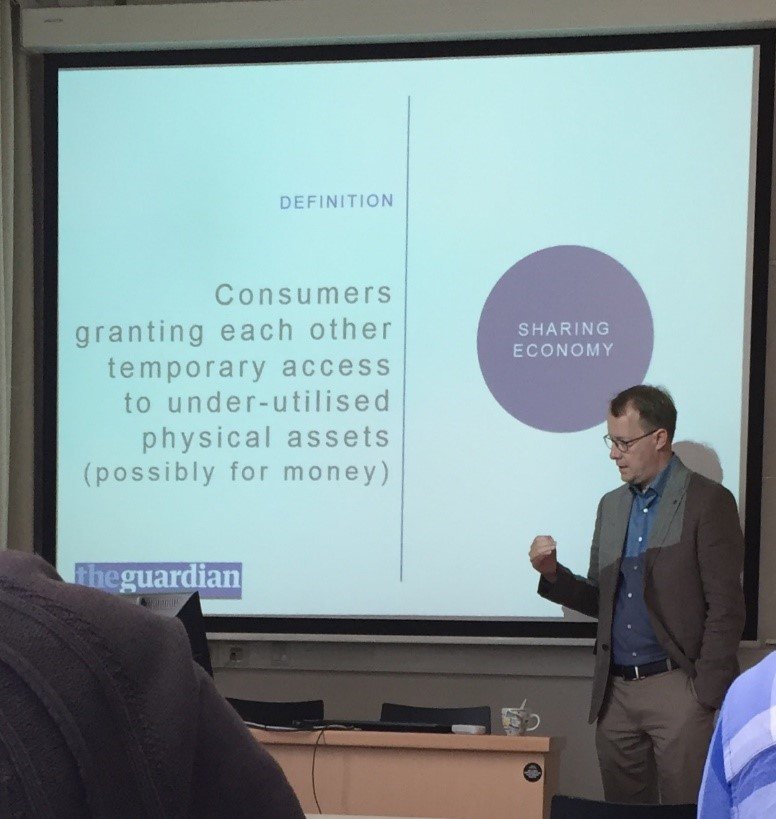What is the Sharing Economy?
Yesterday on a foggy spring day in June I joined a workshop at the University of Ghent about the Sharing Economy. The organizer was a classmate of mine in the year 2000, we studied philosophy at this same university: Rogier De Langhe, now a postdoc in the philosophy of science at our alma mater.
In the evening, I enjoyed a nice dinner with my wife when she asked what it is exactly that fascinates me so about this Sharing Economy. That made me think and I would like to share an extended version of what I told her.
Definition of the Sharing Economy
Before I go into praising the benefits of the sharing economy, I would like to share the definition that Koen Frenken, Professor of Innovation Studies at the Copernicus Institute of Sustainable Development at Utrecht University, put forward in his lecture during the workshop:
Consumers granting each other temporary access to under-utilised physical assets (possible for money).

The Sharing Economy causes a paradigm shift
In the Sharing Economy, a couple of important elements come together. The renewed interest in this type of economy represents a paradigm shift in the field of economic science.
This type of dynamics in science: scientific revolutions, paradigm shifts, the logic of scientific explanation, is something that is, at the core of the philosophy of science, taught and studied at the University of Ghent and where De Langhes expertise lies with his work on my favorite philosopher of science, Thomas Kuhn.
While the concept of sharing resources is not new: people and business have been sharing resources forever. But making the resources easily be accessible for folks a bit farther from our inner circle is a relatively new phenomenon that is strongly amplified through rating systems that allow you to build an online reputation of trust. Those ratings are in their turn more widespread through the digital revolution.
The Sharing Economy introduces decommoditization
It’s exciting to see and define what is actually happening with the rise of the digital revolution nowadays. The industrial revolution that is still spreading its logic to all possible aspects of our life finally finds a worthy opponent: the digitalization, with its zero-marginal-cost and networked organization.
To be more exact: the industrial revolution enforced the first (Private Good) and fourth (Public Good) quadrants of the illustration below. The Private goods and the state that vests the power to enforce those private goods. For a lot of goods, the exclusivity can no longer be enforced.
Think about the difference between a vinyl record and an mp3 file. The former is clearly a consumption good, while the second is more like a common pool good of which the distribution can only be stopped by a lawsuit, and even then…
Another example is car sharing.
Sure, the physical asset of the steel cube on wheels cannot be digitalized, but the logistic process of having such a cube at your disposal where and when you need it, can. If the sharing economy can halt the excesses of over production and obsolesce, that’s not necessarily a bad thing.
The Sharing Economy forces us to think long term
Of course, we live here and now and have to take the opportunities as they come our way.
On the other hand, we also need to think about the longer term to make sure our daily actions are in line with our long-term life plan. This longer term thinking is something I make time for. One day our clients and firm will be confronted with the effects of this type of economy that is only gaining momentum.
You could call it a case of patient urgency. If feel the need to be up to speed with this accelerating phenomenon, but I’m patient to await the right moment to put this newly acquired knowledge to good use.
To a certain extent, we are already confronted with the first exponents of the Sharing Economy that are disrupting certain markets as we speak: Uber and AirBnB are probably the most cited examples. But looking a bit further into this phenomenon we see Wikipedia disrupting the encyclopedia market and Wikileaks disrupting the confidentiality of the diplomatic communication of the government.
In the meanwhile, businesses all around the world are trying to come up with new models to counter the disruption.
Relevance for business today
More and more companies collect client data and establish new business models around the ownership of those terabytes of data. We see large cooperations, involving the open source communities: Microsoft courting Linux, IBM getting involved in Open API, Hitachi buying the open source big data integrator Pentaho.
This presents us with a paradox: the existing platforms such as Google Play or Facebook allow for a lot of different players to build an enormous variety of applications that are grafted to these platforms and that are promoting a vast diversity in every imaginable aspect that we encounter in our private or professional lives.
On the other hand, we are seeing that the platforms on which these applications are running tend to become monopolists: it is virtually impossible to compete against a global player such as Facebook.
The Sharing Economy leads to fruitful synergies
A couple of months ago I attended one of the meet ups of the Ghent Data Science enthused by Sam Rédelé – a former Deloitte colleague. I witnessed a couple of pitches and presentations of young companies and startups talking about algorithms and platforms.
This community is always keen on bringing attention to more technical and business aspects of data science. Those guys and girls are really driving the digitalization for which the academics are trying to craft the conceptual frameworks as they are evolving.
Koen Frenken described this process as reversed technology assessment during the workshop. As an innovation specialist, he helps the government assess new technologies and define the kind of regulations that need to be in place to provide the right legal and fiscal framework for a new product.
In the case of the digital economy, his “research, debate, regulate and sell” process no longer works: the time to market is so short the process is reversed.
Moreover, because more and more organizations consider the data they have on their platform as proprietary, the scientists no longer have data to perform their research on.
Conclusions
For individuals: look for initiatives in the sharing economy that you like and engage yourself as a responsible civilian to restore social contact with your neighbors and save the planet doing so.
For governments: build your own platforms, reform tax laws to make sure you don’t miss out on VAT and wages of the increasing force of freelancers in the digital economy.
For businesses: try to set a standard and become the owner of a monopolist platform, start protecting the data you gather and reorganize your organization to foster the people that can bring the innovation you need to survive. Hint: listen to their wants and needs to working autonomously, but that’s a topic for another discussion.
What do you think? Would you agree with these benefits about the sharing economy? Let me know in the comment section below.
For more tips, check our entrepreneurship section and subscribe to our weekly newsletters.

